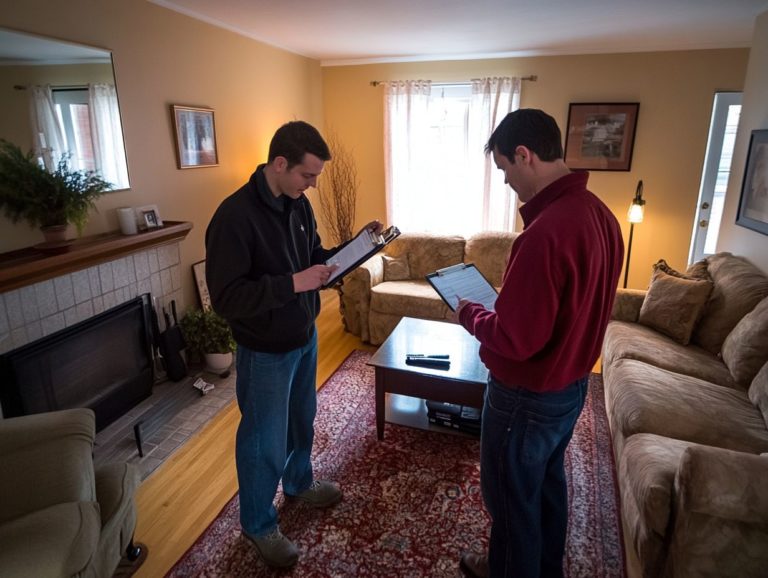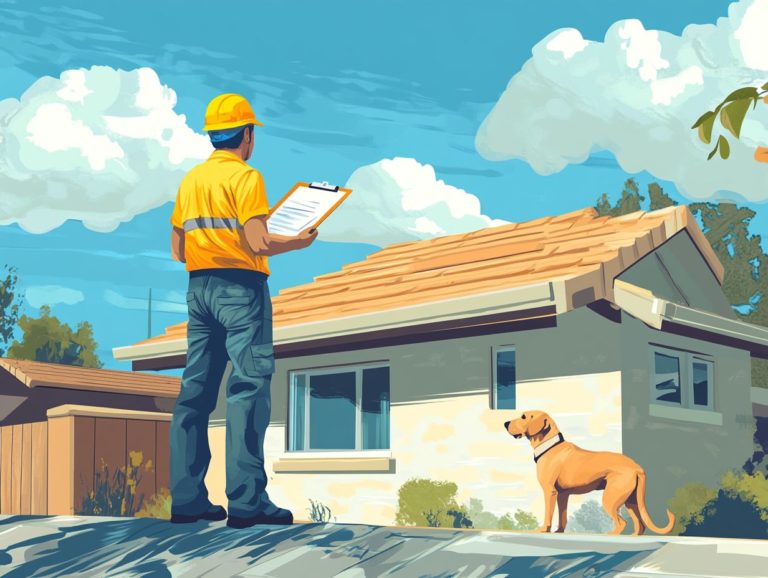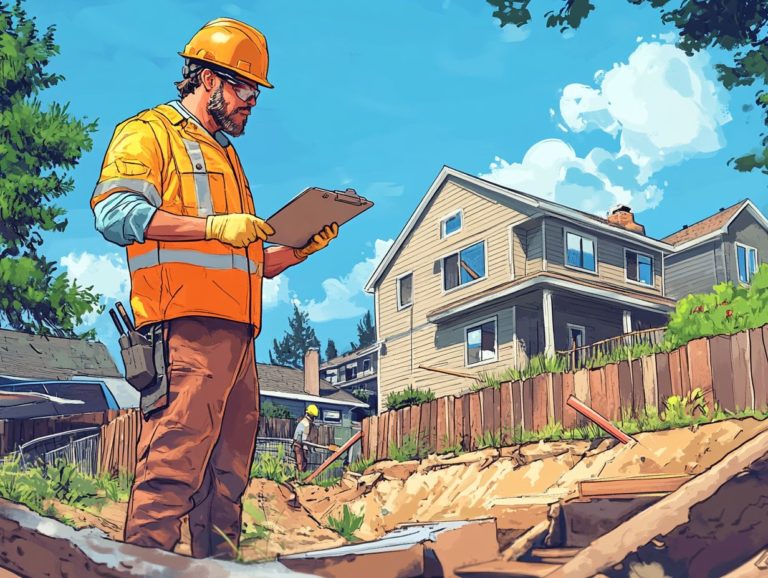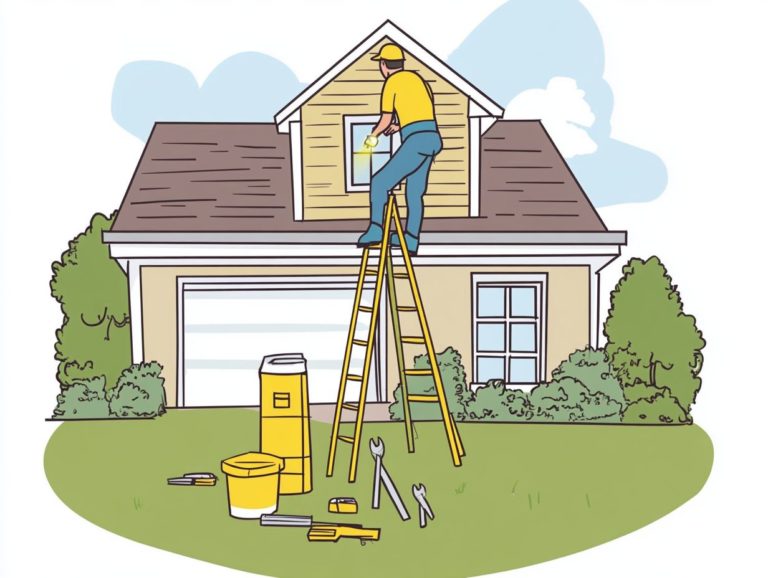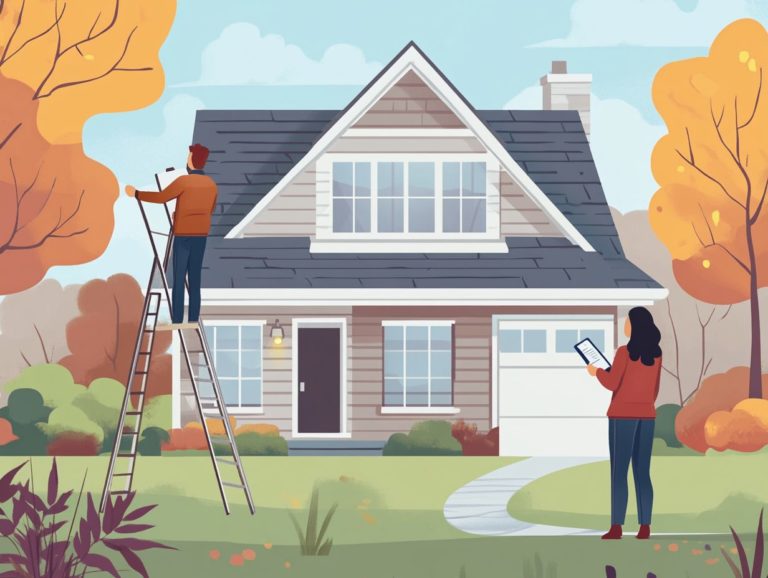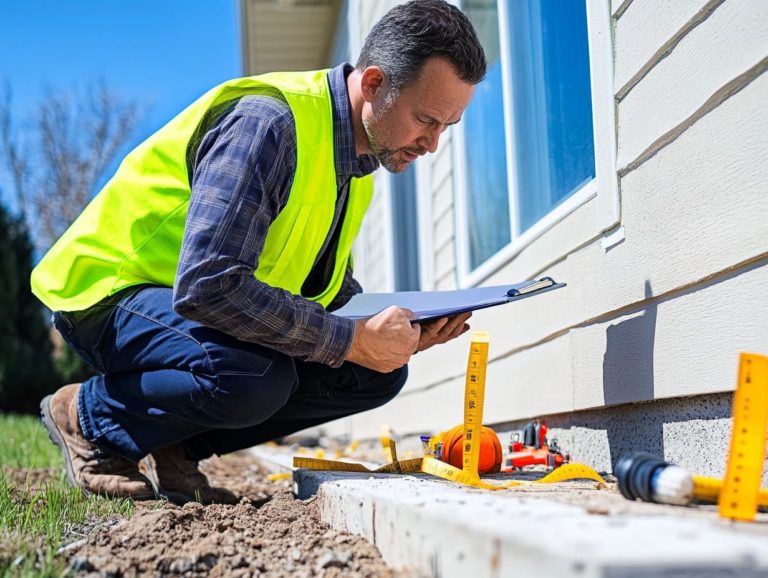How to Choose a Home Inspector for High-Rise Condos
Don’t risk your investment. When you re considering the purchase of a high-rise condo, ensuring its structural integrity and overall condition becomes paramount.
This is where a professional home inspector steps in. Their role is invaluable, as they identify hidden issues and provide you with the peace of mind that comes from knowing your investment is sound.
So, how do you find the right inspector? This article delves into the significance of home inspections, the qualifications you should seek, essential questions to pose, and tips for preparing and navigating the inspection process.
Whether you re a first-time buyer or a seasoned investor, this guide empowers you to approach your condo inspection with confidence.
Contents
- Key Takeaways:
- Importance of a Home Inspector for High-Rise Condos
- Find Your Perfect Home Inspector: What to Look For!
- Questions to Ask a Potential Home Inspector
- Factors to Consider When Choosing a Home Inspector
- Preparing for the Inspection
- What to Expect During the Inspection
- Interpreting the Inspection Report
- Frequently Asked Questions
- What should I look for in a home inspector for high-rise condos?
- Is it necessary to hire a home inspector for a high-rise condo?
- Can I use the same home inspector for a high-rise condo as I would for a single-family home?
- What questions should I ask a potential home inspector for a high-rise condo?
- How much does a home inspection for a high-rise condo typically cost?
- What should I do with the home inspection report for a high-rise condo?
Key Takeaways:

A professional home inspector is essential for high-rise condo purchases, as they can uncover potential issues and save you from costly repairs in the future. To ensure you make the best choice, consider reading about how to choose the right inspector for your home.
When choosing a home inspector, look for certifications and experience in high-rise condos, and consider reviewing how to choose the best home inspector to understand their initial consultation process.
Before the inspection, prepare the unit and gather important documents. During the inspection, expect a thorough examination of common areas and potential issues. Carefully review the inspection report for findings and recommendations.
Importance of a Home Inspector for High-Rise Condos
Engaging a reputable home inspector is vital in your homebuying journey, especially when it comes to high-rise condos. Understanding how to choose an inspector for your home is crucial, as these properties come with their own set of unique challenges, including shared common areas and Homeowners Association (HOA) responsibilities.
A skilled inspector will carefully check important parts, such as electrical systems, plumbing, and structural integrity. This thorough assessment ensures that you are well-informed before you commit to finalizing your purchase contract.
Why You Need a Professional Inspection
Professional inspections are essential for your protection as a buyer. They reveal potential issues that might remain hidden during a casual property walkthrough.
These evaluations reveal hidden issues like pest problems and upcoming repairs, factors that could significantly sway your decision.
With the expertise of an inspector, you receive thorough documentation that outlines both minor and major flaws, enabling you to negotiate from a position of knowledge.
You should be aware of the costs associated with inspections. This knowledge allows you to budget effectively and tackle any financial implications upfront. Ultimately, these comprehensive reports become powerful tools in the negotiation process, equipping you with the necessary information to request repairs or adjust your offer as needed.
Find Your Perfect Home Inspector: What to Look For!
When you’re on the hunt for a home inspector for your condo, it’s essential to thoroughly assess their qualifications by considering how to choose the best home inspector for your needs.
Look for pertinent certifications and a wealth of experience in building inspections, particularly in high-rise structures. Knowing how to select a home inspector for your needs will ensure you make an informed choice and secure the best possible outcome for your investment.
Certifications and Experience
Certifications like those from the National Association of Home Inspectors (NAHI), along with practical experience in building inspections, serve as vital indicators of a quality home inspector’s competence.
These credentials signify a dedicated commitment to ongoing education, ensuring the inspector stays well-informed about the latest codes, standards, and best practices in the industry.
Beyond general inspections, a solid knowledge of condominium assessment can greatly enhance your property oversight. Condo structures often have unique features and shared elements that demand a meticulous eye for detail.
Being skilled in identifying underlying structural problems not only allows for accurate reporting but also reduces potential liabilities for buyers, effectively protecting them against unforeseen issues that may arise in the future.
Questions to Ask a Potential Home Inspector

Asking the right questions leads to thorough inspections. It sets a standard for quality reports.
What to Ask During the Initial Consultation
During your initial consultation, ask about the inspector’s experience with properties like yours and the methods they use to conduct thorough inspections. Inquiring about their past projects and unique challenges can shed light on their problem-solving abilities.
Discussing the tools and technology they use to uncover hidden flaws is equally important, as these elements greatly influence the examination s depth.
For instance, voice any concerns regarding mold, electrical systems, or structural issues. Emphasize the need for detailed inspection recommendations.
Knowing how the inspector points out problems helps you prepare for any negotiations after the inspection.
Factors to Consider When Choosing a Home Inspector
When you re choosing a home inspector, consider several key factors.
Pay attention to their location, their specialization in condo evaluations, and reviews from previous clients. This will help you assess their reliability and expertise effectively.
Location, Specializations, and Reviews
Location is crucial when selecting a home inspector. Local inspectors often have detailed knowledge of specific building codes, Homeowners’ Association rules, and regional issues that could impact your property.
This familiarity is especially important in areas with high-rise structures or unique architectural features. Specialized knowledge can significantly elevate the quality of inspections. For example, an inspector well-versed in condominium regulations or fire safety standards for multi-family units can pinpoint potential hazards that others might miss.
Additionally, online reviews and testimonials from previous clients are invaluable for assessing an inspector s reputation and reliability. Positive feedback often reflects their skill in identifying hidden liabilities, while a lack of reviews may raise red flags about their experience and commitment to quality.
Preparing for the Inspection
Preparing for a home inspection requires you to understand your responsibilities as a buyer. Make sure the property, especially the common areas, is accessible and ready for a comprehensive inspection.
What to Do Before the Inspector Arrives
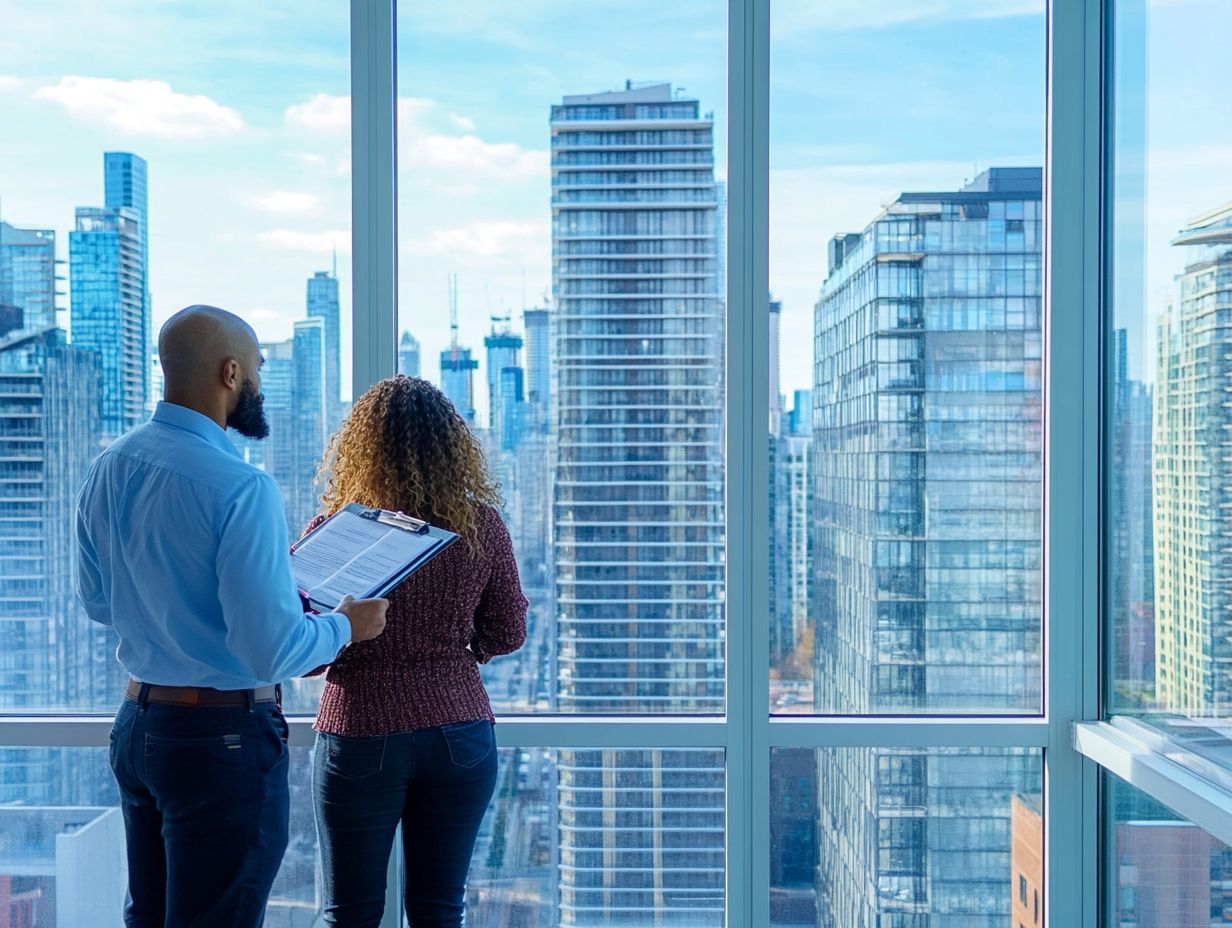
Before the inspector arrives, ensure that all necessary areas, including common spaces and potential inspection sites, are easily accessible and neatly organized. Being prepared allows for a smooth inspection and helps the inspector evaluate the property better.
Create a checklist. Gather essential documents like seller disclosures and previous inspection reports so everything is at your fingertips.
Confirm that utilities such as water, electricity, and gas are turned on. This allows the inspector to assess all systems effectively. Ensure the attic, basement, and other key areas are free of clutter to enhance visibility.
By taking these proactive steps, you re safeguarding your interests and paving the way for a thorough and efficient inspection.
What to Expect During the Inspection
During the inspection, you can expect a thorough evaluation of the property, focusing on essential elements such as structural integrity, electrical systems, plumbing infrastructure, and common areas that may conceal hidden issues.
Common Areas of Focus and Potential Issues
Common areas deserve your undivided attention during inspections. They often reveal structural concerns that could impact the property s overall health.
Inspectors meticulously examine roofing materials for signs of wear or damage. If not fixed quickly, leaks can occur.
Inspectors also check plumbing systems to uncover hidden leaks or outdated pipes that could pose significant long-term risks. HVAC (Heating, Ventilation, and Air Conditioning) systems are checked for efficiency and functionality, ensuring your heating and cooling capabilities are up to par.
Inspectors catch underlying issues early, giving you valuable insights. They often detail these findings in comprehensive inspection reports, enabling you to make informed decisions as a potential buyer.
Interpreting the Inspection Report
Interpreting the inspection report is crucial. It helps you make informed decisions about the property and safeguards your interests as a buyer.
Understanding the Findings and Recommendations
Understanding the inspection report is essential as it directly influences your decisions regarding the property’s condition and any potential negotiations with the seller.
By carefully analyzing the report, you can distinguish between major and minor issues. This distinction will shape your negotiation strategies and determine cost responsibilities.
Major concerns like structural integrity or significant plumbing problems can provide you with substantial negotiating power. They enable you to request concessions, repair credits, or even price reductions. Conversely, minor issues, such as cosmetic damage, might not drastically shift the dynamics of the deal.
Familiarizing yourself with the intricacies of the inspection documentation allows you to clearly articulate your position regarding liability. This, in turn, enables you to approach negotiations with confidence, effectively protecting your investment.
Frequently Asked Questions
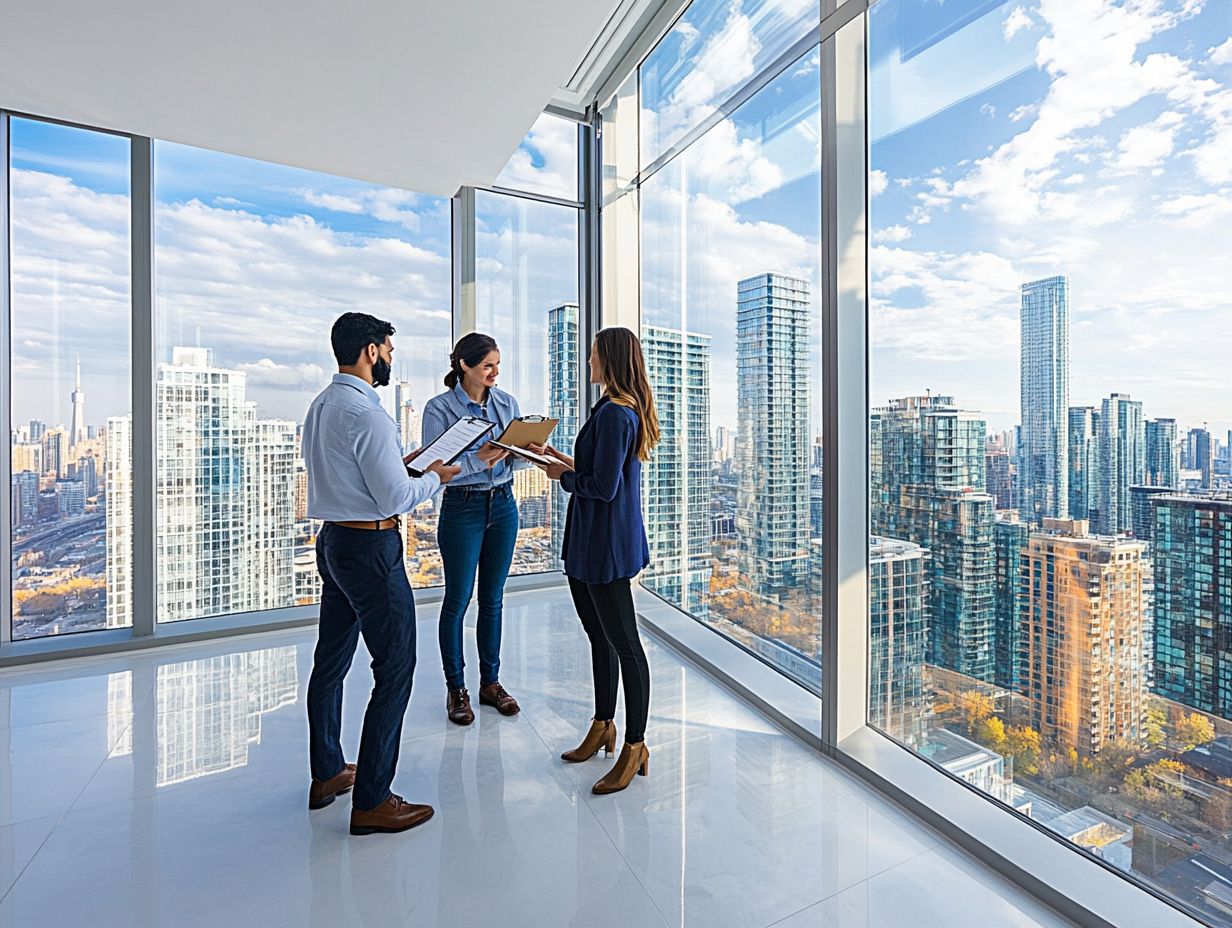
What should I look for in a home inspector for high-rise condos?
When choosing a home inspector for high-rise condos, it’s vital to select someone certified, experienced, and knowledgeable about the unique aspects and potential issues of high-rise buildings. For more guidance on this topic, refer to our resource on how to choose a home inspector. They should have a good reputation and be able to provide references from previous clients.
Is it necessary to hire a home inspector for a high-rise condo?
Yes, it’s vital to hire a home inspector for a high-rise condo. Even though the building may appear to be in good condition, hidden structural or safety issues could exist that only a trained professional can identify. Learning how to choose the right home inspector can give you peace of mind and potentially save you from unexpected expenses in the future.
Can I use the same home inspector for a high-rise condo as I would for a single-family home?
While a home inspector for a single-family home may have the necessary qualifications and experience to inspect a high-rise condo, it’s best to choose someone who understands how to choose the right home inspector for your property. These buildings have unique features and potential issues that require specific expertise to assess properly.
What questions should I ask a potential home inspector for a high-rise condo?
Some important questions to ask a potential home inspector for a high-rise condo include:
- Are you certified and experienced in inspecting high-rise buildings?
- Can you provide references from previous clients?
- How long does a typical inspection take?
- What specifically will you be inspecting in the condo?
- How will you communicate your findings?
- Can I be present during the inspection?
- What is your pricing structure?
How much does a home inspection for a high-rise condo typically cost?
The cost of a home inspection for a high-rise condo can vary depending on the location, size, and age of the building, as well as the experience and qualifications of the inspector. For those considering older properties, it’s important to understand how to choose a home inspector for older homes. On average, you can expect to pay between $300 and $500 for a high-rise condo inspection.
What should I do with the home inspection report for a high-rise condo?
Once you receive the home inspection report for your high-rise condo, review it carefully. To ensure you’ve made the right choice, consider looking into how to choose the right inspector for your property and address any major issues with the seller or building management.
You might want to talk to a real estate lawyer or other experts for advice. Don’t forget to keep the report handy! It will be your best friend for planning any repairs or maintenance down the road.

